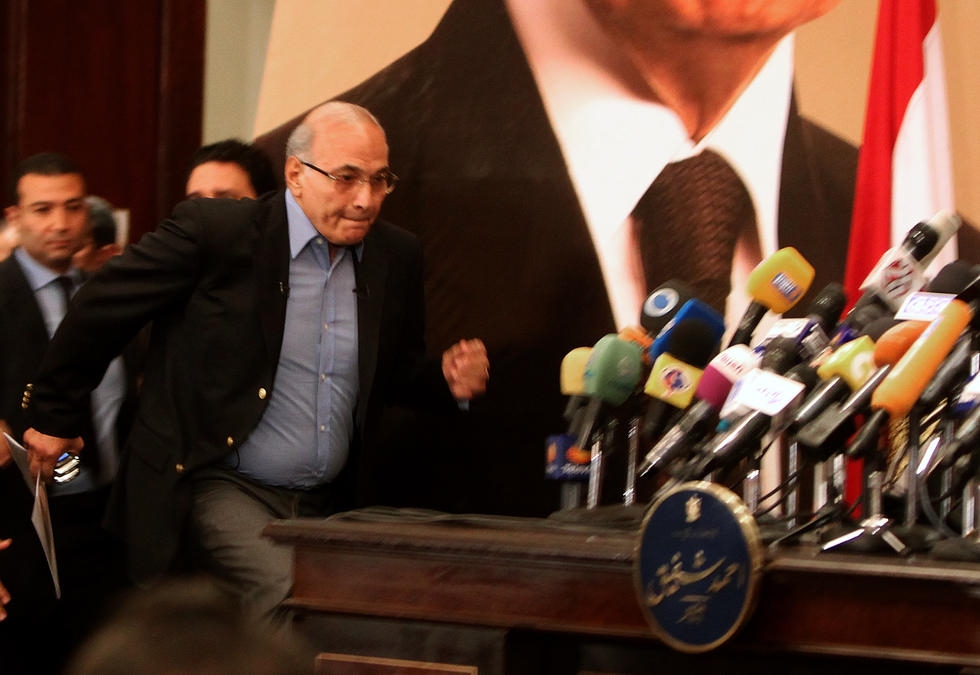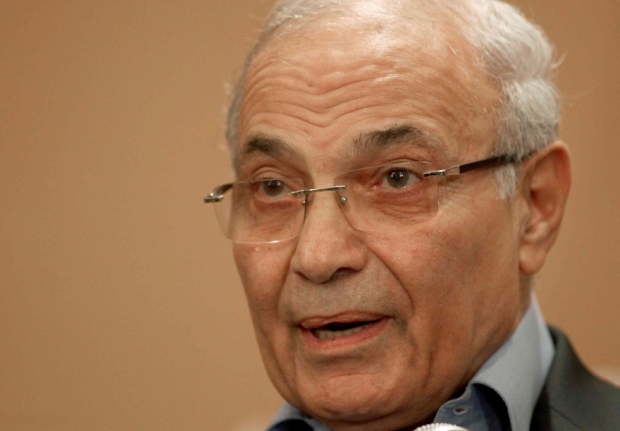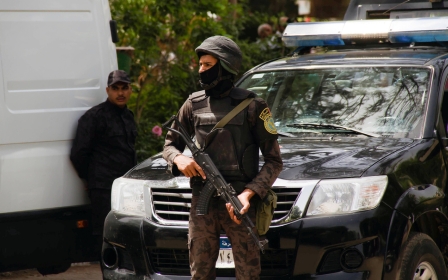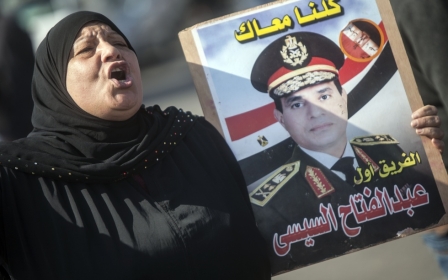I'm banned from leaving UAE says former Egypt PM Ahmed Shafiq

Former Egyptian prime minister Ahmed Shafiq, an ex-presidential candidate who lives in the United Arab Emirates, has been barred from travelling outside the country since 26 November, Middle East Eye can reveal.
A source close to Shafiq told MEE that the former air force pilot had planned to travel to Paris last Sunday, but was not allowed to leave by UAE authorities.
The source added that Shafiq was going to travel to the US and Cairo, where he would have announced his presidential bid for early next year, when President Abdel Fattah al-Sisi is widely expected to seek a second term.
The source also said that Shafiq was already at the airport last Sunday where the authorities told him that he would not be able to board the plane to Paris. After allegedly failing to convince them, Shafiq "prepared" a statement to Reuters, declaring his intentions to run for Egypt's presidency, the source said.
At the same time, Shafiq sent a video to Al Jazeera Arabic - which has been demanded by the UAE to be shut down - confirming that the UAE has banned him from travelling outside the country for reasons that he does not know. In the video, Shafiq also said that the UAE has been interfering in "Egyptian internal affairs".
"I had earlier announced my intention to nominate myself for the presidential election. I had also intended to embark on a tour among Egyptian communities abroad before returning to the homeland. However, I was surprised to be banned from travel for reasons I do not comprehend and I am not willing to understand," Shafiq said, according to an Al Jazeera English translation of the video.
"I would like to express my gratitude to the United Arab Emirates for hosting me throughout the past period. Yet, I reiterate my rejection of the UAE's intervention in Egyptian internal affairs and I object to banning me from moving freely or from exercising my constitutional right," he added.
"I will not reverse my position, which I declared earlier. I am willing to confront all the troubles I am likely to face. I also appeal to the officials in Egypt to intervene quickly so as to remove any obstacles curtailing my freedom of movement.”
The source told MEE that Shafiq leaked the video to Al Jazeera in an effort to pressure the UAE into giving him the ability to travel.
UAE minister says Shafiq is 'thankless'
Following Al Jazeera's publication of the video, the UAE's Minister of State for Foreign Affairs Anwar Gargash posted a series of tweets blasting Shafiq's statements as "thankless".
Translation: The United Arab Emirates regrets that General Ahmad Shafiq has been thankless. Fleeing Egypt, he sought refuge in the UAE after the 2012 presidential election results were announced. We facilitated his stay and offered him our hospitality despite our reservations toward some of his stances.
"In its approach, the United Arab Emirates always favoured adhering to the values of hospitality and providing care out of its love for Egypt and the Egyptians who have in our hearts and in our policy every appreciation and respect. The UAE would like to stress that nothing hinders the departure from the UAE of General Ahmad Shafiq," Gargash added on Twitter.
Shafiq had earlier sent a statement to Reuters saying that he was going to Cairo in the "coming days".
'The UAE would like to stress that nothing hinders the departure from the UAE of General Ahmad Shafiq'
- Anwar Gargash, UAE Minister of State for Foreign Affairs
In a video declaration sent to Reuters and a telephone statement, Shafiq said he would run in the election planned for around April.
“I‘m honoured to announce my will to run in the upcoming presidential elections in Egypt as a choice to lead the country for the next four years,” he said in the statement from the United Arab Emirates.
Shafiq is one of the few candidates who have announced their intentions for 2018.
Taking pride in his strong ties with the military and frequently speaking of his admiration for his mentor and former president Hosni Mubarak, he squared off against the Muslim Brotherhood’s Mohamed Morsi in Egypt’s first free and fair presidential election in 2012.
Shafiq left Egypt after he lost to Morsi - who was himself ousted by the military in 2013 - and faced the prospect of several corruption trials.
But neither Morsi's fall nor the ascension of former military man Sisi to the presidency persuaded Shafiq to return and face trial.
He instead formed a political party and led it from the UAE. The party failed to make significant gains during a 2015 parliamentary election.
Mubarak's man
Born in 1941 in Cairo, Shafiq graduated from the Air Force Academy in 1961. He later completed a master's degree in military sciences and a PhD in military strategy.
He fought in three wars including the 1973 Arab-Israeli war in which he was a senior fighter pilot under Hosni Mubarak's command. He is said to have downed two Israeli airplanes.
Shafiq served as commander of the Egyptian air force from 1996 to 2002 and then went on to become the country's first civil aviation minister, earning a reputation for administrative competence and efficiency.
It was widely believed that Mubarak helped set his career path, even creating the post of civil aviation minister to suit his old comrade and friend.
His restructuring of the state-owned airline, EgyptAir, turned it into a competitive business. He also renovated the nation's airports, giving a boost to the important tourism industry.
Shafiq has portrayed himself as the only presidential contender who combines civilian experience with knowledge of the military, which plays a powerful economic and political role in Egypt
Prior to launching his presidential bid, Shafiq has reached out Egyptian opposition groups spoke directly to the Muslim Brotherhood, whose leadership Sisi has imprisoned.
In media interviews, Shafiq, 70, has portrayed himself as the only presidential contender who combines civilian experience with knowledge of the military, which plays a powerful economic and political role in the country.
He has argued that he can ensure a successful handover of power back to civilian leaders.
"You cannot suddenly bring a civilian man with no relation or knowledge of military life and make him a president and supreme commander of the armed forces," he told the Reuters news agency earlier this year.
He has promised he will change the way the army is treated by the state, making it pay taxes on profit it gets from its wide range of businesses.
After he was selected to be prime minister on 29 January 2011, during the last days of the Mubarak presidency, Shafiq became known as "the man in the blue jumper" or "Mubarak's man" and was made the butt of jokes.
His relationship with the protesters in Tahrir Square worsened as he ignored their demands and offered to send them sweets. He suggested their campsite should simply be converted into a speaker's corner as found in London's Hyde Park.
As pressure mounted on the military, Shafiq stayed in his post for just three weeks after the revolution.
He resigned on 3 March 2011, a day after appearing in a talkshow on ONTV.
Reuters and AFP contributed to this report.
New MEE newsletter: Jerusalem Dispatch
Sign up to get the latest insights and analysis on Israel-Palestine, alongside Turkey Unpacked and other MEE newsletters
Middle East Eye delivers independent and unrivalled coverage and analysis of the Middle East, North Africa and beyond. To learn more about republishing this content and the associated fees, please fill out this form. More about MEE can be found here.





